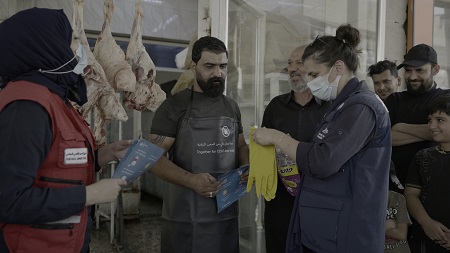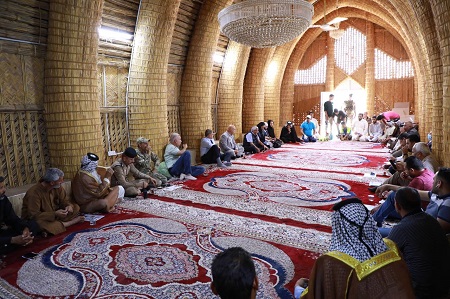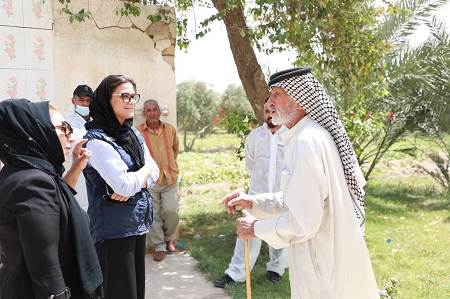 Raising awareness on Crimean-Congo haemorrhagic fever during ArbaeenBaghdad, 3 November 2022 – Over the past few years, risk communication and community engagement (RCCE) has become a core pillar in WHO's work in its quest to enhance community participation in the preparedness and response to different health issues, including emergencies and outbreaks. This strategic investment was further emphasized during the COVID-19 pandemic.
Raising awareness on Crimean-Congo haemorrhagic fever during ArbaeenBaghdad, 3 November 2022 – Over the past few years, risk communication and community engagement (RCCE) has become a core pillar in WHO's work in its quest to enhance community participation in the preparedness and response to different health issues, including emergencies and outbreaks. This strategic investment was further emphasized during the COVID-19 pandemic.
In Iraq, WHO and the Ministry of Health managed to reach millions of people through various awareness activities and multiple approaches to reach different community groups in response to COVID-19, the Crimean-Congo haemorrhagic fever and cholera outbreaks, as well as other health concerns.
"RCCE hasn't only helped in building trust among communities across Iraq, but also in increasing their sense of ownership and accountability to take action to address health hazards," said Dr Ahmed Zouiten, WHO Representative in Iraq.
"We had to look for a new way to deal with new demands. We had to look for ways to reach the public directly. And this is where we are at this point in time."
During the Crimean-Congo haemorrhagic fever outbreak, the WHO team worked with the Ministry of Health and the Ministry of Agriculture to consolidate the coordination and response to the outbreak by reaching the most affected areas in the southern governorates and delivering messages to the communities at large. High-risk groups like butchers, households and livestock traders were also reached.
 Meeting communities in Missan governorate to sensitize them on the Crimean-Congo haemorrhagic fever outbreak
Meeting communities in Missan governorate to sensitize them on the Crimean-Congo haemorrhagic fever outbreak
Mass gathering events
Concerned with the public health risks during mass gathering events, WHO, along with the Iraqi Red Crescent Society and the Ministry of Health, joined forces to inform the communities and the Arbaeen visitors to ensure they are equipped with prevention methods, so they keep themselves healthy and safe.
Around 18 500 sessions were conducted in 572 high-risk areas in 11 governorates, reaching 139 000 people.
250 field volunteers and outreach teams from WHO and the IRC were trained and mobilized to perform thousands of meetings with the high-risk groups. They succeeded in reaching hundreds of thousands of people with health education materials and messages on the prevention of diseases, including Crimean-Congo haemorrhagic fever, cholera and COVID-19.
Enhancing health messages on social media
WHO's RCCE adopted new trends and approaches to reach an audience with eye-catching, appealing products and contextualized materials in line with the Iraqi culture, norms and dialects.
 The WHO team reached millions of people through various awareness-raising activities on Crimean-Congo haemorrhagic fever in Iraq
The WHO team reached millions of people through various awareness-raising activities on Crimean-Congo haemorrhagic fever in Iraq
Through the past year, dozens of high-quality videos, motion graphics, animations, cartoons, radio drama and infographics were produced in Arabic and Kurdish to disseminate awareness messages on different outbreaks hitting Iraq. Celebrities and community influencers were also engaged to help amplify these messages on different platforms.
RCCE workshops and capacity-building sessions targeted around 4500 faith and tribal leaders and more than 9000 frontline responders, including health workers, health educators and community volunteers. These training workshops contributed substantially to building the capacity of these groups to convey health messages on preventive measures against different diseases.
"We will extend the scope of RCCE to other noncommunicable diseases and communicable diseases, and we will definitely make RCCE one of a flagship programmes that we will use in our quest to promote health, serve the vulnerable, and keep the world safe," Dr Zouiten said.



